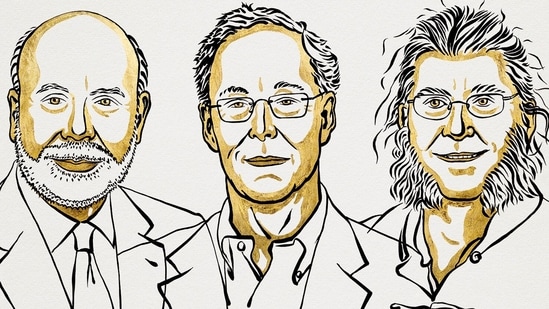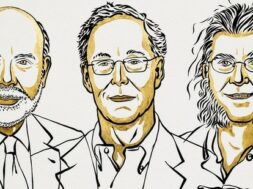
Nobel Prize season closes with 3 US economists winning it in Economics
Virendra Pandit
New Delhi: Former US Federal Reserve chief Ben Bernanke along with fellow American economists Douglas Diamond and Philip Dybvig won the 2022 Nobel Economics Prize “for research on banks and financial crises”, the Royal Swedish Academy of Sciences said on Monday.
Bernanke was chairperson of the US Federal Reserve from 2006 to 2014 and is now at the Brookings Institute in Washington, D.C. Diamond is a professor at the University of Chicago Booth School of Business, and Dybvig is a professor at the Olin Business School of Washington University in St. Louis.
The economics prize is not one of the original five Nobel Prizes created in the 1895 will of Swedish chemist, industrialist, engineer, and dynamite inventor Alfred Nobel. They started these Prizes in 1901. Sweden’s central bank established the Economics Prize, which was first awarded in 1969. Its full and formal name is the “Sveriges Riksbank Prize in Economic Sciences in Memory of Alfred Nobel.”
The Nobel Prize in Economics is the last of this year’s Nobel awards. The winners of the Prize will receive 10 million Swedish kronor (USD 883,000) each.
The Nobel committee said their work in the early 1980s had “significantly improved our understanding of the role of banks in the economy, particularly during financial crises,” and showed why it is vital to avoid bank collapses. They added this was “invaluable” during the 2008-09 financial crisis and the coronavirus pandemic.
Bernanke’s analysis of the Great Depression in the 1930s showed how and why bank runs were a significant reason, and the crisis was so long and severe. Diamond and Dybvig’s work looked at the socially important role banks play in smoothing the potential conflict between savers wanting access to their money and the economy needing savings to be put into investments; and how governments can help prevent bank runs by providing deposit insurance and acting as a lender of last resort.
“Ben Bernanke in a paper from 1983 showed with statistical analysis, and historical sources, that bank runs led to bank failures and this was the mechanism that turned a relatively ordinary recession into the depression in the 30s, the world’s most dramatic, and, a severe crisis that we have seen in the modern history,” said John Hasler, member of the committee for the Nobel Prize for Economics.
The trio joins such luminaries as Paul Krugman and Milton Friedman, previous winners of the prize.
Most previous Nobel Laureates have been from the United States. Only two women have ever won it: Elinor Ostrom in 2009 and Esther Duflo in 2019.
The Royal Swedish Academy of Sciences selects the winners from a list of candidates recommended by the Economic Sciences Prize Committee. This makes its selection from names submitted by around 3,000 professors, previous winners, and academy members by invitation. People cannot nominate themselves.
Last year, they split the Nobel Prize in Economics between David Card, for his work on labor economics, and Joshua D. Angrist and Guido W. Imbens for their contributions to the analysis of causal relationships.
They awarded the renowned Nobel Peace Prize last Friday to Belarusian human rights activist Ales Bialiatski, the Russian human rights organization Memorial and the Ukrainian NGO Center for Civil Liberties.
This year’s prize for physics went to Alain Aspect, John Francis Clauser, and Anton Zeilinger, for discoveries in quantum mechanics. The Nobel committee said they had used “groundbreaking experiments” investigating particles in entangled states to begin a new era of quantum technology.
They split the chemistry prize between Carolyn R. Bertozzi, for her work using click and bio-orthogonal chemistry to map cells and develop more targeted cancer treatments; and Morten Meldal and K. Barry Sharpless, whom the committee said “laid the foundations of click chemistry,” which involves connecting biocompatible molecules.
They awarded the medicine prize to Swedish scientist Svante Paabo “for his discoveries concerning the genomes of extinct hominins and human evolution.”
The prize for literature went to French author Annie Ernaux.













